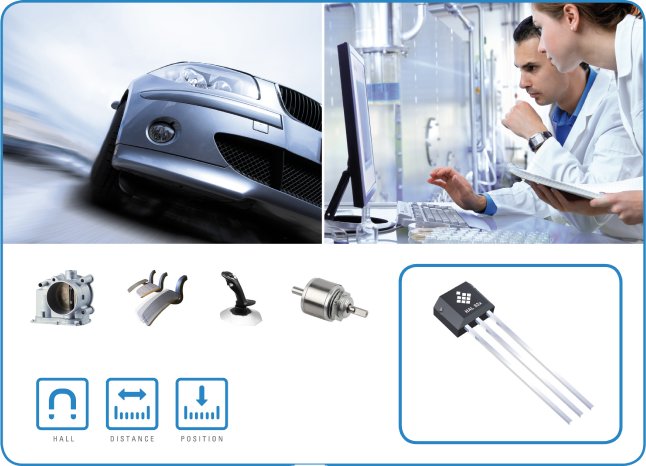Micronas (SIX Swiss Exchange: MASN), known and recognized in the automotive and industrial business as a global partner for intelligent, sensor-based system solutions, today presents the HAL 835 as first member of the new HAL 83x family. With these highly precise magnetic field sensors of the latest generation Micronas brings unique sensor solutions to the market.
Micronas enables its customers the use of Linear Hall sensors under most demanding environmental conditions with highest reliability.
"With this new Hall sensor family, Micronas now covers all application fields for Linear sensors on the market. The HAL 835 represents the ideal solution for the measurement of linear movement, position detection, current measurement, or for use as contactless potentiometer", explains Dirk Behrens, Vice President Automotive at Micronas.
The HAL 835 was developed as a response to newest market trends. These trends include the demands of the automotive industry for higher ESD protection of the sensors, the increased use of smaller magnets and thus lower magnetic field strengths, as well as the need for even more accurate measurements of parameters in the power train due to more stringent emission standards. With the HAL 835 sensor Micronas is answering to all of these demands.
The adjustable, smallest measurement range of HAL 835 could be extended to ±15 mT while the resolution is still 12 bit (7.5 µT / bit). Compared to its predecessor HAL 825, offset and sensitivity drift have been further reduced. With a differential nonlinearity (DNL) of <0.9 LSB Micronas fulfills highest demands to the measurement precision. Furthermore, the bandwidth of the internal filter has been extended.
Beside customers' most frequently requested output formats (analog/PWM) the HAL 835 offers another format: multiplex-analog. This, thanks to the separate transmission of the MSB and LSB part of the measurement signal, features an increased signal-to-noise ratio. In addition, the implemented digital back-bias cancellation reduces the influence of interfering static magnetic fields. This allows the execution of highly precise measurements.
The compact design of modern combustion engines leads to increasing demands of the temperature behavior to the sensing parts. Here, Micronas relies on its long-term proven CMOS technology. Devices produced on the basis of this technology are designed for junction temperatures up to 170 °C. The HAL 835 has an integrated EEPROM for the storage of the sensor parameters, which works reliably up to 170 °C, as well.
These features provide the HAL 835 with the needed precision for detecting the position of throttle valves of the next generation in vehicles for instance. Thus, the sensor contributes to less fuel-consumption as well as to reduced CO2 emissions. With the delivery of the devices in the "green package" according to the RoHS directive, Micronas commits itself to sustainable environmental protection.
The HAL 83x sensors are produced in the mouldable TO92UT package. First samples of the HAL 835 are available as of today. Start of production is planned for the end of the third quarter 2013.
For evaluation and fast integration into customer applications, Micronas offers a special programming board. The needed software is provided free of charge.
Micronas will present the HAL 835 from May 14 to 16, 2013 at the Sensor+Test in Nuremberg (hall 12, booth 302).


